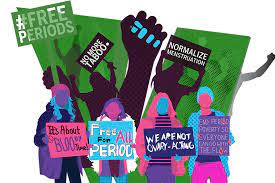Period Poverty; A Worldwide Epidemic that No One Cares About

March 28, 2023
https://www.schulich.uwo.ca/rapport/2020/topical/period_poverty.html
The term period poverty is not exactly a recently coined term, first coming to public light in 2017. So why is it that when it comes to the utilization of the phrase, most people are stumped with understanding the meaning behind it? Because they simply do not care about it.
“Period poverty” is a phrase commonly used to reference the struggle to afford sanitary products that people with periods may face. Tampons, pads, liners, everything that essentially controls the inevitable menstruation cycle that dawns on those with uterus’ once a month. Especially when the harsh effects of the worldwide pandemic come into play, being able to prioritize either food or menstrual products first, proved itself to be a very difficult decision. According to a 2021 nationwide survey of secondary school students, George Mason University and the University of Pennsylvania have determined that about 1 out of 10 female students cannot afford menstrual products every month, leading to even further consequences including missing class and an increase in depression rates.
Here is another fun fact for you, about 17 million people who have periods in the US, live in poverty. Yeah. Poverty. Meaning that, hey, maybe they can’t buy tampons or pads every month to facilitate their normal bodily function. Not only is the imaginative scenario of bleeding all over yourself and wherever you sit embarrassing, (which it shouldn’t be, however I’ll save that for another article) but it also makes it harder for these people to live in sanitary conditions. It is clear that this is an existing issue for people who live in poverty, and it can also ultimately affect when people work and are able to earn money. For example in a Bangladesh study (that’s right, this is a worldwide issue), women with periods missed an average of 6 days a month while menstruating, therefore losing salary and finally contributing more to the worldwide poverty rate.
In most places around the world in fact, one will find that period products are defined as “luxury goods” therefore also imposing a tax on them. Oh my goodness yes it sure is a luxury to bleed and hurt profusely every month! Personally, I love it so much. Like, seriously, how is something that people cannot control, and as we have learned, cannot afford, considered a “prize” that they should be eternally grateful for? It is clear that period poverty is not only a cleanliness issue in today’s society, but ultimately restricts those who have them in an educational and ambitious sense. Forcing time off and essentially taking away from that person’s life and what they are able to achieve in it. Period poverty is real, and in order to change this precedent set by the white men who run everything, society must be responsible for informing itself of everything we are not supposed to question, to eventually induce reform.

